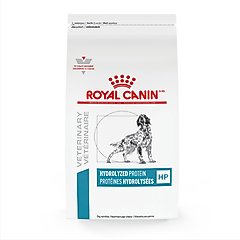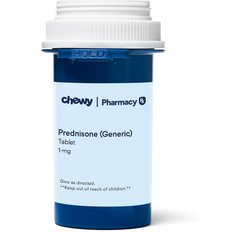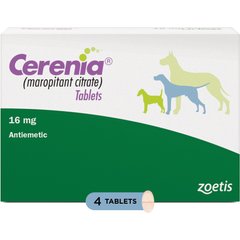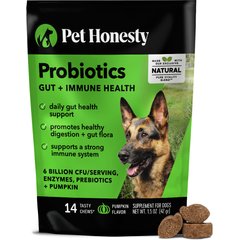What Is Inflammatory Bowel Disease (IBD) in Dogs? Symptoms and More

Photo by Evrymmnt/iStock/Getty Images Plus
If your dog has been experiencing chronic vomiting, diarrhea, or unexplained weight loss, they might be dealing with more than just an upset tummy.
Inflammatory bowel disease (IBD) in dogs is a syndrome that affects the gastrointestinal (GI) tract, leading to uncomfortable and sometimes debilitating symptoms.
We spoke with two veterinarians to get the inside scoop on IBD in dogs—covering everything: from the signs, what causes it, and how it’s treated.
Knowing this information can help you spot the early warning signs in your pooch and take proactive steps to keep the condition under control.
What Is Inflammatory Bowel Disease in Dogs?
“Inflammatory bowel disease is a chronic condition or syndrome where there is a specific inflammatory reaction to irritation of the gastrointestinal tract,” says Jessica Apted, DVM, regional medical director for Sploot Veterinary Care’s practices in the Denver area.
While the exact cause of the irritation is often unclear, inflammatory cells flock to the affected areas, triggering an allergic-like response in the gastrointestinal (GI) tract. Any part of the GI tract can be affected, but the stomach and intestines are the most common targets, Dr. Apted says.
The GI tract normally allows for smooth digestion and absorption of nutrients, but in IBD, it becomes thickened and swollen due to the accumulation of inflammatory cells. This disrupts the dog’s ability to properly digest food and absorb nutrients, Dr. Apted explains.
Though IBD is usually not life-threatening, if left untreated, it can lead to severe dehydration, weight loss, malnutrition, and even blood clots, which can be fatal. To prevent these complications, early intervention and regular monitoring are key.
What Are the Symptoms of Inflammatory Bowel Disease in Dogs?
The symptoms of IBD in dogs can vary, depending on the severity of the inflammation and which part of the GI tract is affected. The most common symptoms associated with IBD in dogs include:
- Chronic vomiting (if the stomach is involved)
- Chronic diarrhea (if the intestines are involved)
- Increased or decreased appetite
- Excessive gas
- Low energy
What Causes Inflammatory Bowel Disease in Dogs?
“In many cases, the exact cause of IBD is unknown,” Dr. Apted noted. “However, it’s likely to be a combination of factors.” These factors can lead to irritation or damage in the gastrointestinal tract, which may then trigger an inflammatory response.
According to Dr. Apted, some potential causes include:
- Intestinal parasites, such as giardia
- Bacterial or viral infections
- Gut dysbiosis (an imbalance in the composition of the gut microbiome)
- Food allergies or sensitivities
- Immune system dysfunction (an overactive immune system)
According to Penny Coder, DVM, senior veterinarian at Small Door Veterinary in Bethesda, Maryland, genetics can also play a role.
Certain breeds seem to be more predisposed, including:
As for age, Dr. Coder says IBD typically first occurs in middle-aged dogs. The exact cause for this is unknown, but it is likely due to a combination of genetic and environmental factors.
How Do Vets Diagnose Inflammatory Bowel Disease in Dogs?
Your vet will begin by asking about your dog’s symptoms and any dietary changes.
To rule out other conditions and gather evidence for IBD, they’ll perform tests that may include:
- Blood work
- Fecal analysis
- Ultrasounds
- X-rays
- Bacterial cultures: A small sample of stool is spread onto a culture plate and sent to a special laboratory to see if specific bacteria grow that could have triggered IBD.
While these tests can provide valuable clues, a biopsy of the GI tract—performed through endoscopy or surgery—is ultimately required to confirm an IBD diagnosis.
This can provide insight as to which type of inflammatory cells are present and the best treatment option for that dog.
However, in many cases, a diagnosis of IBD is presumed, based on symptoms and preliminary test findings without a biopsy.
For cases that are not responding to treatment or that are severe, referral to a veterinary internist may be needed and a biopsy is more likely to be done for an accurate diagnosis.
How Do Vets Treat Inflammatory Bowel Disease in Dogs?
While there is no cure for IBD, the condition can be controlled and managed. Here’s an overview of how vets treat IBD.
Dietary Changes
One of the first steps in managing IBD is often modifying the dog’s diet. This is done because some dogs may have developed sensitivities to their current food.
Vets may recommend a novel protein diet (containing a protein the dog hasn’t eaten before), or a hydrolyzed protein food like Royal Canin® Hydrolyzed Protein Dry Dog Food, where the protein is broken down into smaller particles to reduce the likelihood of an immune response.
Medications
Medications are typically used to reduce and manage IBD symptoms. According to Dr. Coder, these may include:
- Corticosteroids: These anti-inflammatory medications, such as prednisone or budesonide, are used to reduce inflammation in the GI tract.
- Immunosuppressive drugs: In cases where corticosteroids are ineffective or cause side effects, drugs like azathioprine or cyclosporine may be used to suppress the overactive immune system and manage inflammation.
- Antibiotics: If a bacterial infection is present, an antibiotic, such as metronidazole or tylosin, may be needed.
- Anti-nausea medication: For dogs that experience frequent vomiting, medications like maropitant citrate (Cerenia®) may be prescribed to manage nausea and prevent vomiting.
- Appetite stimulants: In cases where a dog loses their appetite, a vet may recommend an appetite stimulant like mirtazapine to encourage eating.
Supportive Care and Supplements
Supportive care and supplements can help reduce symptoms and enhance long-term digestive health. Dr. Coder highlights some key options that can make a difference:
- Fluids: If a dog has severe diarrhea or vomiting, they may require fluid therapy to prevent dehydration and maintain electrolyte balance. This can be administered through IV or subcutaneous fluids.
- Vitamin B12 (cobalamin) supplementation: Dogs with chronic IBD often have deficiencies in vitamin B12 due to poor absorption in the intestines. Giving your dog a B12 supplement (with your vet’s approval) can improve energy levels and gastrointestinal function.
- Probiotics: Giving your dog a probiotic supplement—such as PetHonesty Probiotic Soft Chews or Purina® Pro Plan® FortiFlora Powder—may help restore a healthy balance of gut bacteria and support digestive health.
- Fiber supplements: Fiber supplements, which typically contain ingredients like psyllium husk and pumpkin, can help regulate digestion, improve stool consistency, and support overall gut health. A couple of dog parent favorites include NaturVet® Stool Ease Soft Chews and Native Pet Organic Pumpkin Fiber Powder.
Recommended Products
How Do I Prevent My Dog From Getting Inflammatory Bowel Disease?
While there is no guaranteed way to prevent your pup from developing IBD, there are steps you can take to reduce their risk and promote overall gut health.
- Feed a balanced, high-quality diet: Choose a nutritionally balanced dog food that is made with high-quality ingredients and doesn’t contain many (or any) artificial ingredients.
- Promote a healthy gut microbiome: Consider adding probiotics to your dog’s diet (or choosing a food that includes probiotics, such as Purina® Pro Plan® Adult Lamb & Rice Dry Dog Food) to help maintain a healthy balance of gut bacteria.
- Schedule regular veterinary checkups: Routine vet visits allow for early detection of potential GI issues. If your dog starts showing signs of digestive problems, such as vomiting, diarrhea, or appetite changes, early intervention may help prevent more serious conditions like IBD from developing.
FAQs About Inflammatory Bowel Disease in Dogs
How long can a dog live with IBD?
Dogs with IBD can live a normal lifespan with proper management and treatment. The key is early diagnosis and consistent care, including a tailored diet, medication, and regular veterinary checkups.
What foods should a dog with IBD avoid?
Your vet may recommend that you avoid feeding your dog foods that commonly trigger inflammation, such as low-quality proteins, artificial additives, wheat, and known allergens. It’s typically best to stick to limited-ingredient, novel protein, or hydrolyzed diets as recommended by your vet.
Which dog breeds are prone to IBD?
While any dog can develop IBD, certain breeds are genetically predisposed to the syndrome, including German Shepherds, Basenjis, Soft-coated Wheaten Terriers, Boxers, French Bulldogs, Doberman Pinschers, Mastiffs, and Alaskan Malamutes.
IBD is a chronic condition, but many dogs can enjoy a good quality of life with the right treatment plan. However, IBD isn’t the only cause of chronic vomiting and diarrhea in dogs.
Always work with your veterinarian to determine the cause of any concerning symptoms in your dog.
Attributions
This content was medically reviewed by Chewy vets.







